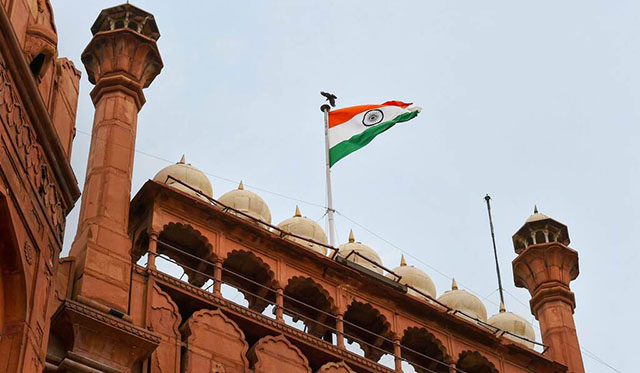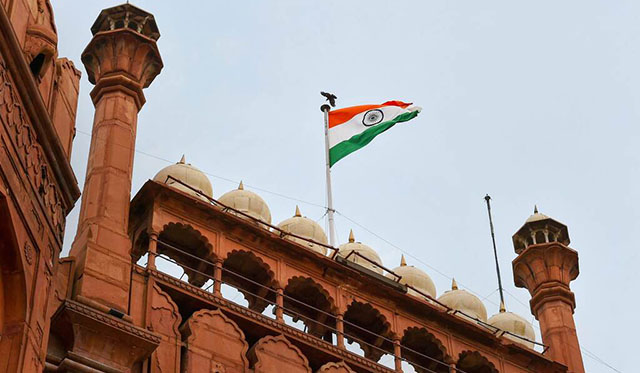For more than six decades, political and official corruption was a defining component of India’s global image as a “third-world country”. This plague persists to this day in varying degrees and it is fruitless to discuss it any further. What might be quite fruitful is a brief historical sojourn tracing one of the most definitive and pivotal sources of this corruption. This is the system of Nazars (gifts or presents) introduced during the Muslim rule of India in the medieval period.
Among its other meanings, the term Nazar generally means “eye”, “sight”, “to set one’s eye upon”, and so on. It also has cultural and social connotations originating mostly in superstitious elements such as the infamous “evil eye”. In Islam, especially, it also has theological significance rooted in various phobias, and there are elaborate rituals which help in “removing Nazar”. In fact, Prophet Mohammed advises all true Muslims to recite Masha Allah “every time we look at something with exhilaration in order to prevent casting the evil eye”. In the Quran and Hadiths, the Prophet commands thus:
1. The evil eye is real, and if anything were to overtake the divine decree (al-qadar) it would be the evil eye.
2. The evil eye makes the person enter the grave and makes the camel enter a pot.
We also have a rather incredible list of symptoms where a victim of Nazar suffers from body weakness, poor appetite, laziness, no motivation “to be better”, dizziness, migraine, business losses, crying for no reason, loss of love, uncontrollable sweating and urinating, back and shoulder pain, and other unmentionable afflictions.
Facets of Nazar as Institutionalised Corruption
But the implication of Nazar as an established and mandatory political practice of making gifts as a form of supplication and acceptance of overlordship had far-reaching and corrosive consequences as we shall see.
The history of the Muslim period of India shows that this practice was regally-sanctioned corruption because it emanated directly from the Sultan himself. It reached its apogee during the Mughal rule, especially in the regimes of Jahangir and Shah Jahan.
Nazar must be clearly distinguished from the ancient tradition of Hindu statecraft where an imperial ruler (Samrat or Chakravarti) extracted tributes from his vassals. The system of tributes chiefly served a twofold function. The first was the implicit agreement that the vassal would be militarily protected by the monarch. The second was that the hand of the monarch would not directly touch the citizenry of the vassal. Thus, the tributary system acted as a stabilising force and maintained law and order and did not cause violent economic or social upheavals. But the most important distinction is the fact that under the tributary system, the common citizen was not required to pay tributes directly to the royal coffers.
The exact opposite is true of Islamic regimes that ruled India. In fact, a defining trait of these administrations was premised on a straightforward maxim of oppression: extort as much as your official position allows you to. Arguably, this pyramidical system of extortion was first systematized by Ala-ud-din Khalji as part of his celebrated “administrative reforms.” Its brutal outcome took less than five years to manifest: lakhs of Hindu peasantry lost their lands overnight and were impoverished to service his unquenchable thirst for wealth and war and to satisfy his vanity of being called the “Sikandar of Hindustan.”
Ever since, there was no looking back.
Nazars in the Mughal Empire
In the Mughal period, Nazars decided the fate of court cases adjudicated by corrupt Qazis. An appropriate Nazar was the only line that separated a farmer from livelihood and penury. Likewise, the right sum of Nazar miraculously infused compassion into the vice-ridden heart of the revenue collector. In some cases, clandestine Nazars also decided the fortunes of a scheming fourth wife of a courtier or Mansabdar. Over three or four chapters, the 17th century Dutch official Pelsaert gives us a sickening picture of how this system operated in Jahangir’s empire:
“… the avarice of the nobles has no solid basis, though they devote themselves entirely to gathering their treasures, without a thought of the cruelty or injustice involved…As regards the laws, they are scarcely observed at all, for the administration is absolutely autocratic, but there are books of law, which are in charge of their lawyers, the Kazis…but who will excommunicate the Pope? … although in every city there is a Kacheri, or royal court of justice, where the Governor, the Diwan, the Bakhshi, the Kotwal, the Kazi, and other officers sit together daily…Here all disputes are disposed of, but not until avarice has had its share… One must indeed be sorry for the man who has to come to judgment before these godless ‘un-judges.’ Their eyes are bleared with greed, their mouths gape like wolves for covetousness, and their bellies hunger for the bread of the poor; everyone stands with hands open to receive, for no mercy or compassion can be had except on payment of cash. This fault should not be attributed to judges or officers alone, for evil is a universal plague; from the least to the greatest, right up to the King himself, everyone is infected with insatiable greed.”
The list is nearly endless.
Clearly, even this brief survey unambiguously reveals the truth that this horrid phenomenon of institutionalised bribery that stubbornly refuses to be controlled even in our own time has its origins in the prolonged Muslim rule of India. But it really acquired its hydra-headed form under Mughal suzerainty. No matter what your status was, you had to pay Nazar to even meet an official with some rank. This cancer still persists: there are any number of examples where you need to bribe the P.A. of a minister for his pleasure of granting you an appointment.
Hypocrisy was the natural handmaiden of the practice of Nazar. We can cite the example of the barbarian Bakhtiyar Khalji whose blitzkrieg of Jihads in southern Bihar and Bengal earned him the moniker of “the rising star and crescent-moon of Islam in infidel Hindustan”. The crafty Bakhtiyar once met Qutub-ud-din Aibak with a substantial booty of Nazar, all plundered from Hindus. Aibak warmly embraced him and threw a grand party lasting several days. Before Bakhtiyar left, Aibak conferred a Khillat or robe of honour upon him.
The British Record
For all their faults, the British have left behind meticulous and minute details of their encounters with and in India. Thus, we have voluminous records that show their disgust towards the Nazar system practiced by the Mughals. Until the East India Company attained dominance, its officials unfailingly showed humility to the Mughals and paid them Nazars. But when the tables were turned, they not only stopped paying Nazars but openly flouted even ordinary etiquette in their dealings. However, it appears that even after the Mughal power did not exist beyond the Red Fort, Akbar Shah II, father of Bahadur Shah Zafar, had learnt no lessons.
Two revealing episodes show the extent of his delusion.
Warren Hastings, the then Governor General, once called upon Akbar II. He placed two preconditions to visit the tattered Mughal court: I need to be offered a chair equal to that of the king and I won’t offer any Nazar. While Akbar II accepted both conditions, his mother scolded him: don’t agree, we are still the Mughals_._ When Warren Hastings heard this, he promptly cancelled the visit.
The second episode occurs in the Governor Generalship of Amherst in 1826. When he visited this decayed Mughal’s court, he was made to sit on a chair situated to the left of the “emperor,” and was exempted from paying Nazar. He also received a reverse-Nazar from the king. Nobody was fooled: in reality, the Mughal had paid protection money to Amherst.
However, this should not be construed as evidence of the high ethical standards of the British. The opposite is actually true. There are indeed scores of instances showing how the East India Company wilfully turned a blind eye to the Nazars that its high-ranking officials privately accepted. On the surface, the pioneering robber-baron Robert Clive had passed an official order prohibiting his officials from accepting Nazars. But there was a rider: sometimes, it became “inevitable” to accept Nazars. In such cases, the officials had to deposit the gifts in the Company’s treasury. These items were later publicly auctioned and the cash proceeds were appropriated by the Company.
However, the EIC officials quickly devised match-fixing methods to bypass this infernal obstacle. Edward Colebrooke, a minister in William Bentinck’s cabinet is a typical case. He had succumbed to his wife’s avarice for exotic Indian riches and amassed exorbitant sums. His modus operandi was simple. He faithfully deposited the Nazars in the EIC treasury. But when the auction came up, he himself purchased the items at prices he had predetermined, at dirt cheap prices and pocketed the difference. He was eventually caught, tried, and dismissed from service.
But one swallow maketh not a summer. Quite the contrary. In an official dispatch dated April 1860, Viceroy Canning openly boasted about devising methods to corrupt the psyche of Indians so that the British Empire in India could be maintained forever. He recommended that “restless men and crafty intriguers bred up in Native Courts [i.e. Indian Princely States> could live contentedly if we made all India into zillas. If we could keep up a number of Native Citizens without political power, but as [British> royal instruments, we should exist in India as long as our naval superiority in Europe was maintained.”
Epilogue
The system of Nazars obstinately persevered even in the twentieth century, most notably in the court of the Nizam of Hyderabad. KM Munshi who was tasked with liberating Hyderabad noted as recently as 1946-8:
“The Nizam had an annual privy purse of five million rupees plus miscellaneous allowances from the State. Add to this an annual income of twenty-five million rupees from Sarf-i-Khas, vast tracts of land, which he treated as his personal property. Then there was the unending supply of Nazars (gifts) he received almost on a daily basis… Every notable person who visited the Exalted, either by invitation or not, was obliged to present an asharfi, a gold sovereign — or its equivalent which was Rs 124 — as nazar for the privilege of meeting him. On his birthday, he received nazars from everyone, from the wealthiest nobles down to a low paid officer.”
Likewise, the history of India after Independence presents another living proof of the fact that the Nazar system merely altered form. The shell was democracy. The core remained intact. In fact, the courtiers of Jawaharlal Nehru, but more prominently, Indira Gandhi, were the ultimate _Nazar-_givers. We have the high-profile and venal example of Jayanti Dharmateja who gifted expensive Russian mink coats to Indira Gandhi herself and hosted her two young sons at decadent chateaus on the coast of France. The other disgusting example is Bansi Lal who openly boasted, “I have the calf (Sanjay Gandhi) firmly under my leash. The cow will naturally follow.” Further commentary is both superfluous and beneath dignity.
We can close this essay by quoting SL Bhyrappa’s memorable observation: “Every tactic that Indira Gandhi used and every political caper that she launched, annihilated the ethical edifice of a profound ancient civilisation based on Dharma. She provoked the worst tendencies of human nature. In the Bharata of my time, she was the deadliest ethics-destroying force that ever arose.”
That’s how things fell. On the ethical and philosophical planes, Indira Gandhi was the most recent human incarnation and an accomplished practitioner of the Islamic system of Nazar or political corruption.
The author is founder and chief editor, ‘The Dharma Dispatch’. Views expressed are personal.
Read all the Latest News , Trending News , Cricket News , Bollywood News , India News and Entertainment News here. Follow us on Facebook , Twitter and Instagram .


)




)
)
)
)
)
)
)
)